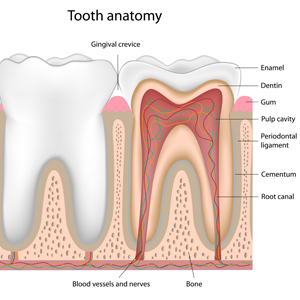 Causes, Symptoms, and When to Seek Endodontic Treatment
Causes, Symptoms, and When to Seek Endodontic Treatment
Tooth pain can be more than just an inconvenience—it could be a sign of a deeper issue, like pulpitis. Pulpitis is the inflammation of the dental pulp, the soft tissue inside your tooth that contains nerves and blood vessels. This condition can cause significant discomfort and, if left untreated, may require endodontic intervention such as a root canal.
What Is Pulpitis?
Pulpitis occurs when the pulp inside a tooth becomes inflamed due to irritation or injury. The pulp is vital to tooth development, but once the tooth matures, it can survive without the pulp, making endodontic treatment possible to save the tooth even after the pulp is damaged.
Types
- Reversible Pulpitis: In this case, the inflammation is mild, and the tooth pulp can heal once the irritant is removed. With reversible pulpitis, early intervention—such as treating cavities or performing a filling—can save the tooth without needing more extensive procedures.
- Irreversible Pulpitis: If the inflammation is severe and the pulp is damaged beyond repair, it is classified as irreversible. In these cases, the tooth cannot heal on its own, and the affected pulp will need to be removed, typically through a root canal procedure.
Causes
Several factors can cause pulpitis, ranging from dental decay to physical trauma. Here are some common causes:
- Cavities: Untreated cavities can penetrate the enamel and dentin, eventually reaching the pulp and causing inflammation.
- Trauma: Physical trauma to the tooth, such as a fracture or crack, can expose the pulp and lead to infection or inflammation.
- Repeated Dental Procedures: Multiple restorations or dental procedures on the same tooth can irritate the pulp over time.
- Advanced Gum Disease: In severe cases, gum disease can cause the gums to recede, exposing the tooth’s root and leading to pulp infection.
Symptoms
Recognizing the signs of pulpitis is crucial for seeking timely treatment. Symptoms may vary depending on whether the pulpitis is reversible or irreversible:
Reversible Pulpitis Symptoms:
- Mild sensitivity to hot, cold, or sweet foods
- Sensitivity that lasts only a few seconds and resolves once the stimulus is removed
- Occasional, manageable discomfort
Irreversible Pulpitis Symptoms:
- Sharp, severe pain that may radiate to other areas of the face or jaw
- Pain that lingers after exposure to heat or cold
- Spontaneous toothache with no apparent trigger
- Pain when chewing or biting
- Swelling or sensitivity around the affected tooth
If you’re experiencing any of these symptoms, especially the more intense and persistent ones associated with irreversible pulpitis, it’s essential to consult an endodontist as soon as possible.
Treatment
When reversible pulpitis is diagnosed, treatment is often straightforward. Addressing the underlying cause, such as filling a cavity or repairing a cracked tooth, can alleviate the inflammation and save the tooth without further intervention.
However, if irreversible pulpitis is present, the inflamed pulp must be removed to prevent the infection from spreading. This is where root canal therapy comes into play:
- Root Canal Therapy: During a root canal, the endodontist removes the damaged pulp from the inside of the tooth, cleans and disinfects the canals, and then seals them with a biocompatible material to prevent further infection. The tooth is then restored with a crown to protect its structure and function.
- Extraction: In severe cases where the tooth is too damaged to save, extraction may be necessary. However, most endodontists aim to preserve the natural tooth whenever possible through root canal treatment.
The Importance of Early Intervention
The earlier pulpitis is detected, the better the chances of saving the tooth with minimal intervention. Ignoring symptoms of pulpitis can lead to severe infection, abscess formation, and even tooth loss. Early diagnosis not only alleviates pain but also reduces the need for more extensive and costly procedures. So please don’t hesitate to contact our office.





Comments are closed.